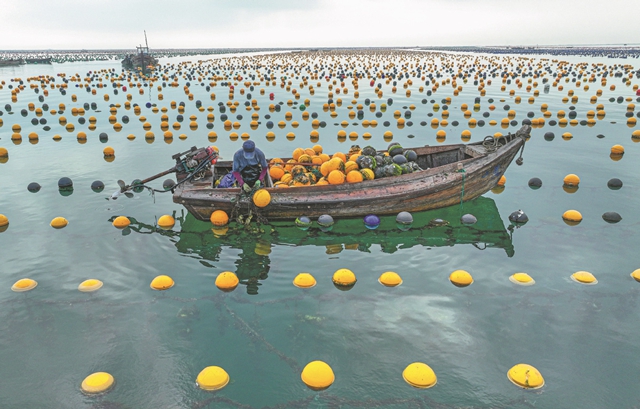New ideas floated to curb carbon


A fisherman checks buoys made from eco-friendly materials that pose no harm to the ocean environment, at an aquaculture farm in Rongcheng city, Shandong province, on Sept 19. LI XINJUN/FOR CHINA DAILY
Editor's note: As protection of the planet's flora, fauna and resources becomes increasingly important, China Daily is publishing a series of stories to illustrate the country's commitment to safeguarding the natural world.
Shandong province introduces broad range of measures to promote clean development and financially benefit residents
Thirty-something Hou from Jinan, Shandong province, opens a mini-program on her mobile phone that tracks, encourages and rewards carbon reduction to see how much she has earned from selling recyclable items over the past two months.
The amount is a respectable 255 yuan ($35), according to the mini-program Tanhui Qilu, one of the innovative measures introduced in Shandong as part of its broader efforts to promote environmentally friendly practices among the public, communities and businesses.
Hou, who chose not to give her last name, said the app makes it easier to embrace a green lifestyle. "The 'carbon-inclusive' house where I can sell recyclable waste is the part I like the best," she said. "It's a convenient way to deal with waste."
She tries to reduce her carbon footprint by walking or using buses for transportation, and selling recyclable items such as cardboard cartons, plastic and clothing via the platform. Over the past five months, she has managed to reduce her carbon dioxide emissions by 572 kilograms, the mini-program tells her.
Hou has also collected 252 carbon credits by practicing low-carbon activities and answering questions about carbon emissions. These credits can be exchanged for tickets to scenic spots and to pay for hotel rooms.
"The carbon-inclusive platform encourages public participation in energy-saving and carbon emission-reduction actions, promoting sustainable and eco-friendly lifestyles," said Wu Hongyang, director of the climate change response office of Shandong's Department of Ecology and Environment.
It also plays a crucial role in leading Shandong toward green, low-carbon, and high-quality development, he added.
Since China set the goals of peaking carbon dioxide emissions before 2030 and achieving carbon neutrality by 2060, green and low-carbon concepts and innovations have been applied in people's daily activities and industrial sectors.
To date, China has established 572 national-level demonstration areas of ecological civilization construction, according to information released by the Ministry of Ecology and Environment at the China Ecological Civilization Jinan Annual Conference on Saturday. In addition, 240 bases for innovative practices in line with the concept of "lucid waters and lush mountains" being "invaluable assets" have been established, with 32 demonstration areas and 11 bases in Shandong.
MOST POPULAR
- 1 China to give visa-free treatment to another 9 countries
- 2 China fully opens manufacturing sector to foreign investors in landmark opening up move
- 3 China's import expo attracts record-breaking participating countries, exhibitors
- 4 China's door opening even wider to foreign visitors, businesses
- 5 China revises rules to ease foreign strategic investment in listed firms
Editors' Picks
 Video:
Peru sees new port open
Video:
Peru sees new port open
 Infographic:
China's public holidays for 2025
Infographic:
China's public holidays for 2025
 Infographic:
Basic facts of APEC
Infographic:
Basic facts of APEC
 Infographic:
Wrapping up the 7th CIIE: Data recap
Infographic:
Wrapping up the 7th CIIE: Data recap



